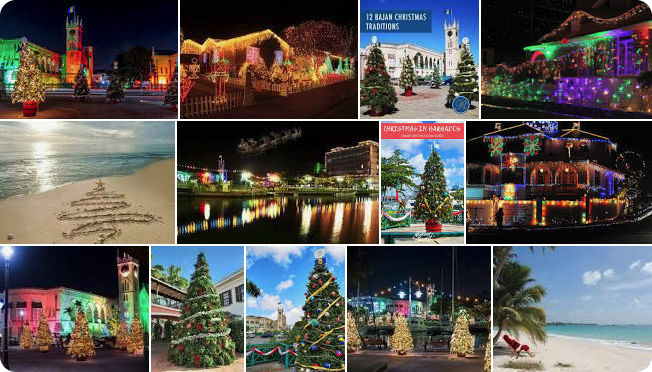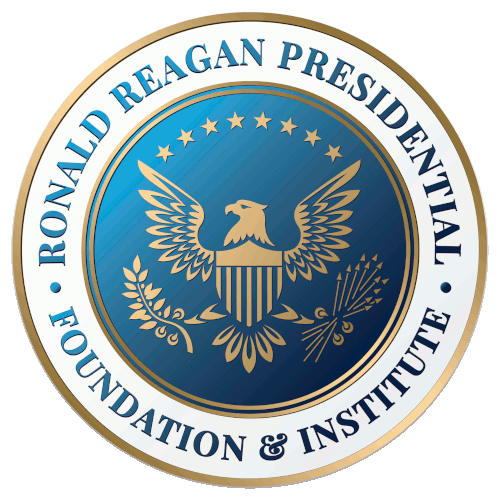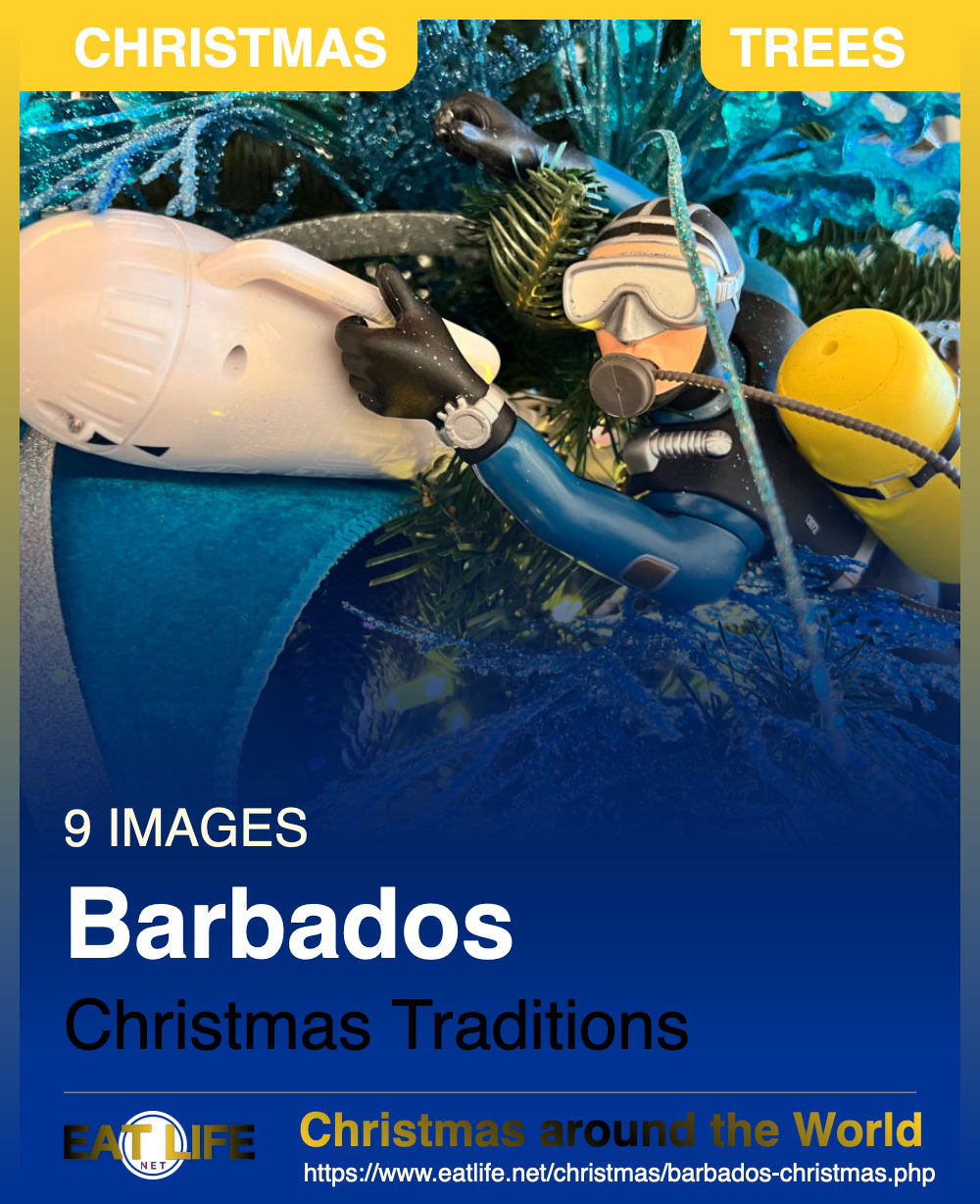BAJAN CHRISTMAS
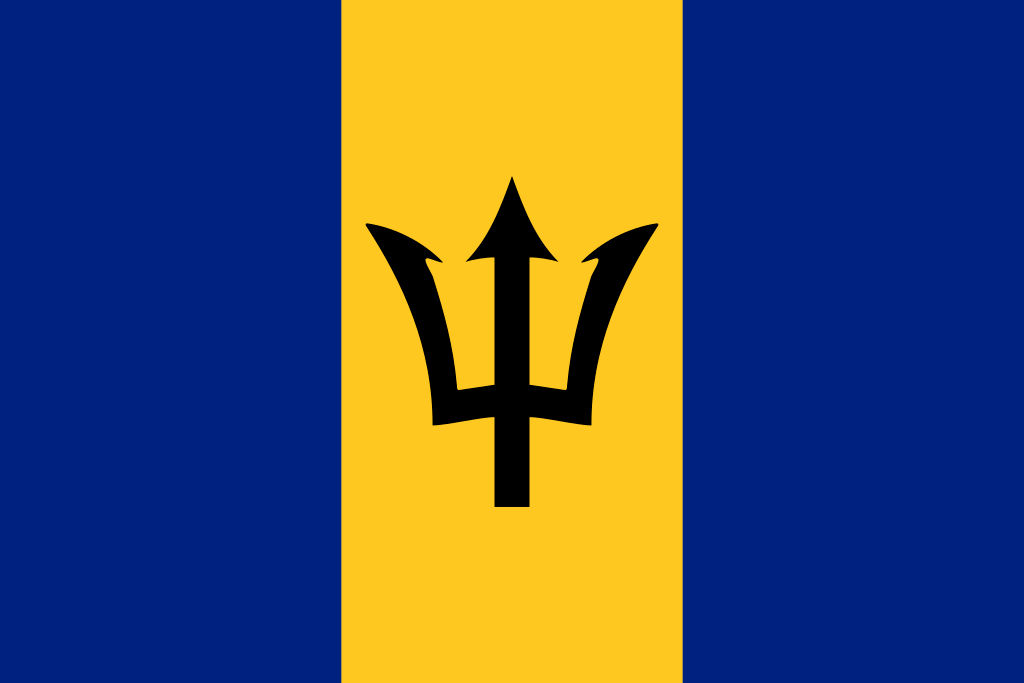
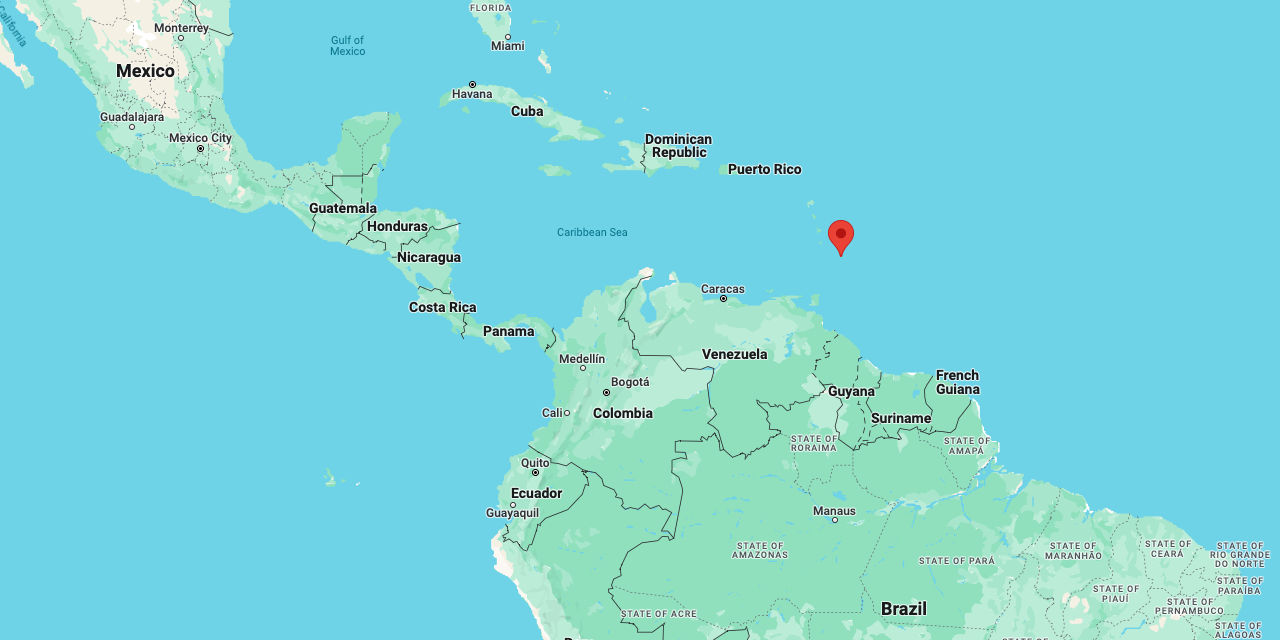
https://www.google.com/maps/place/Bridgetown,+Barbados
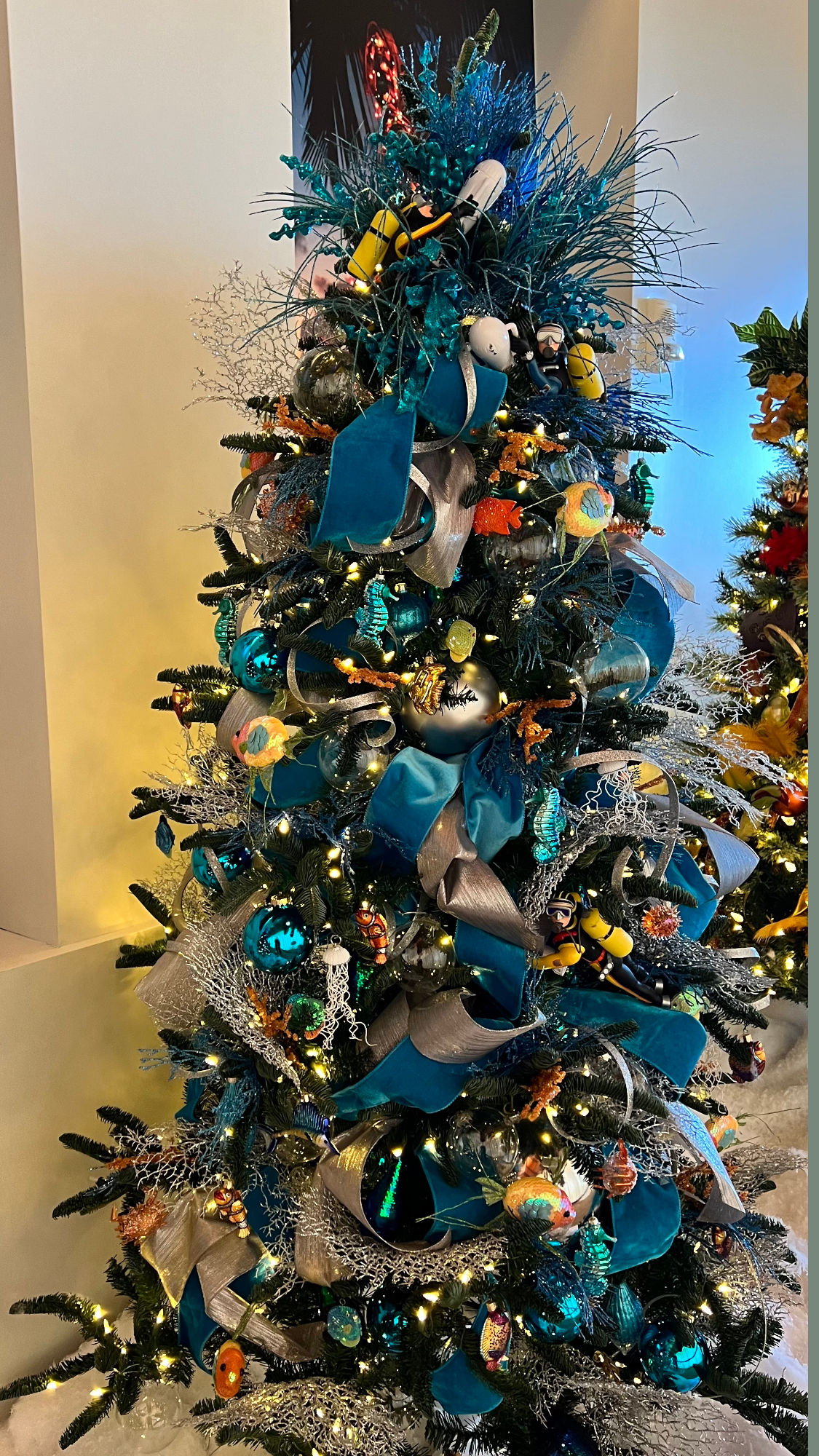
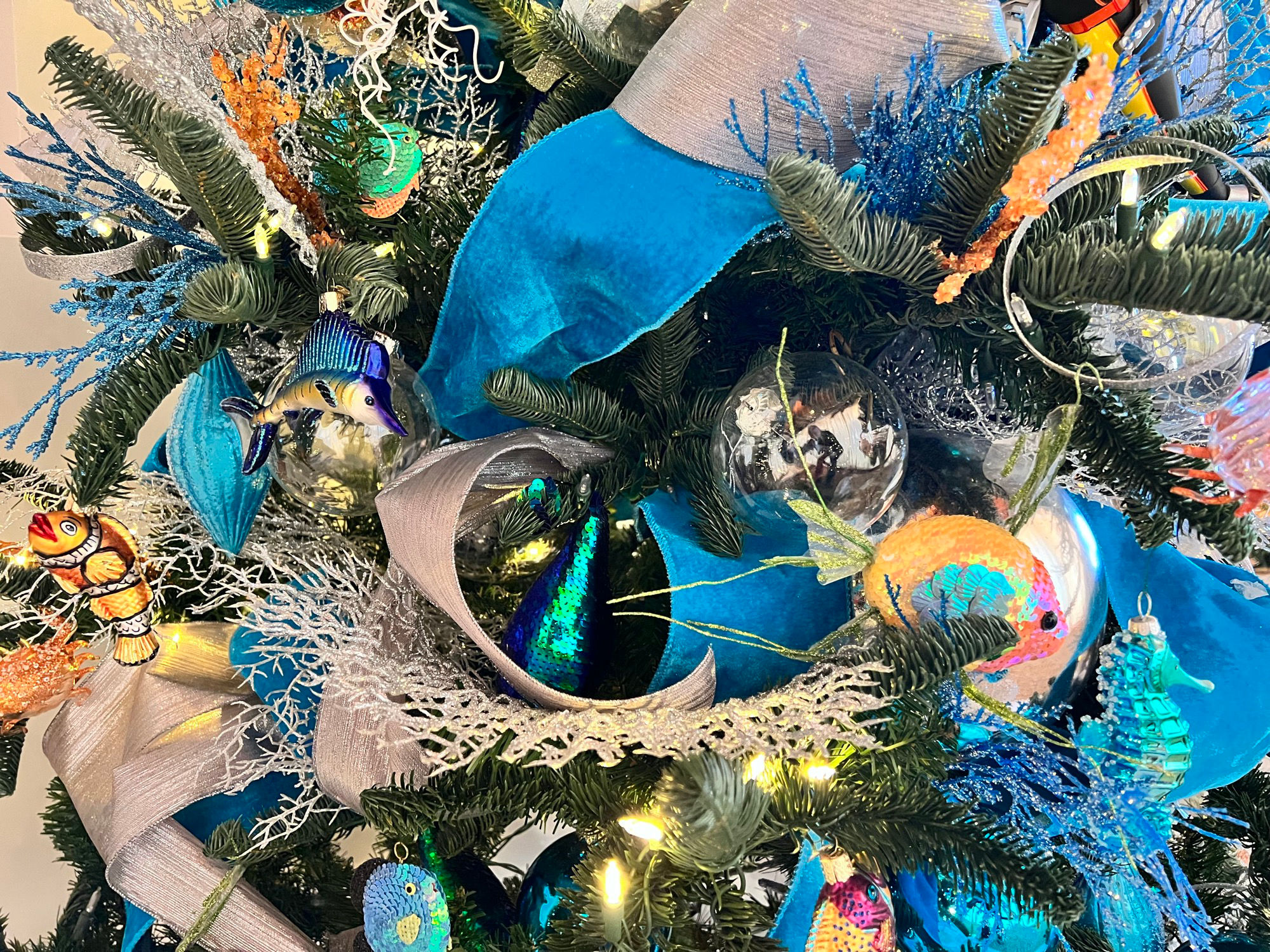
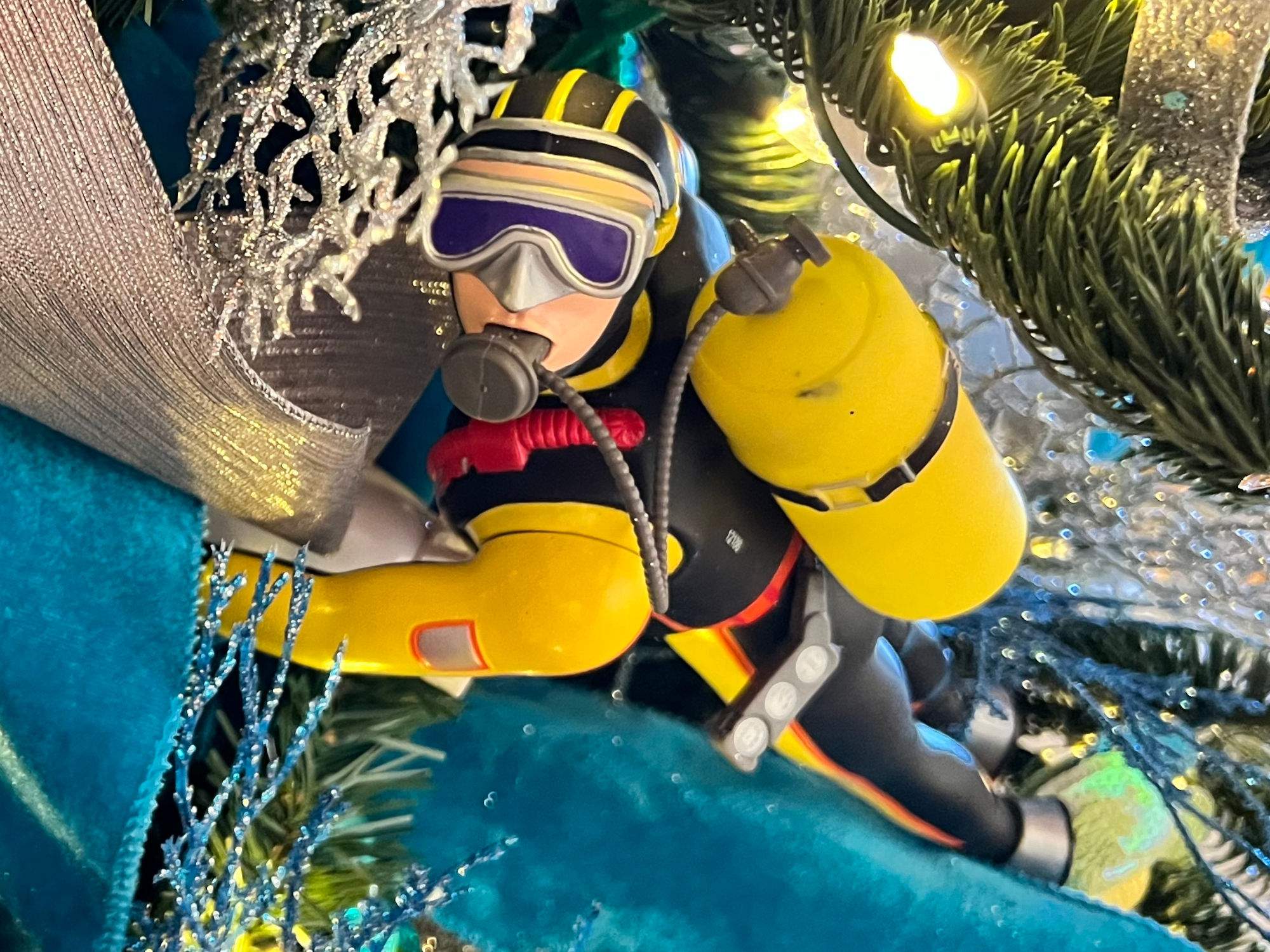
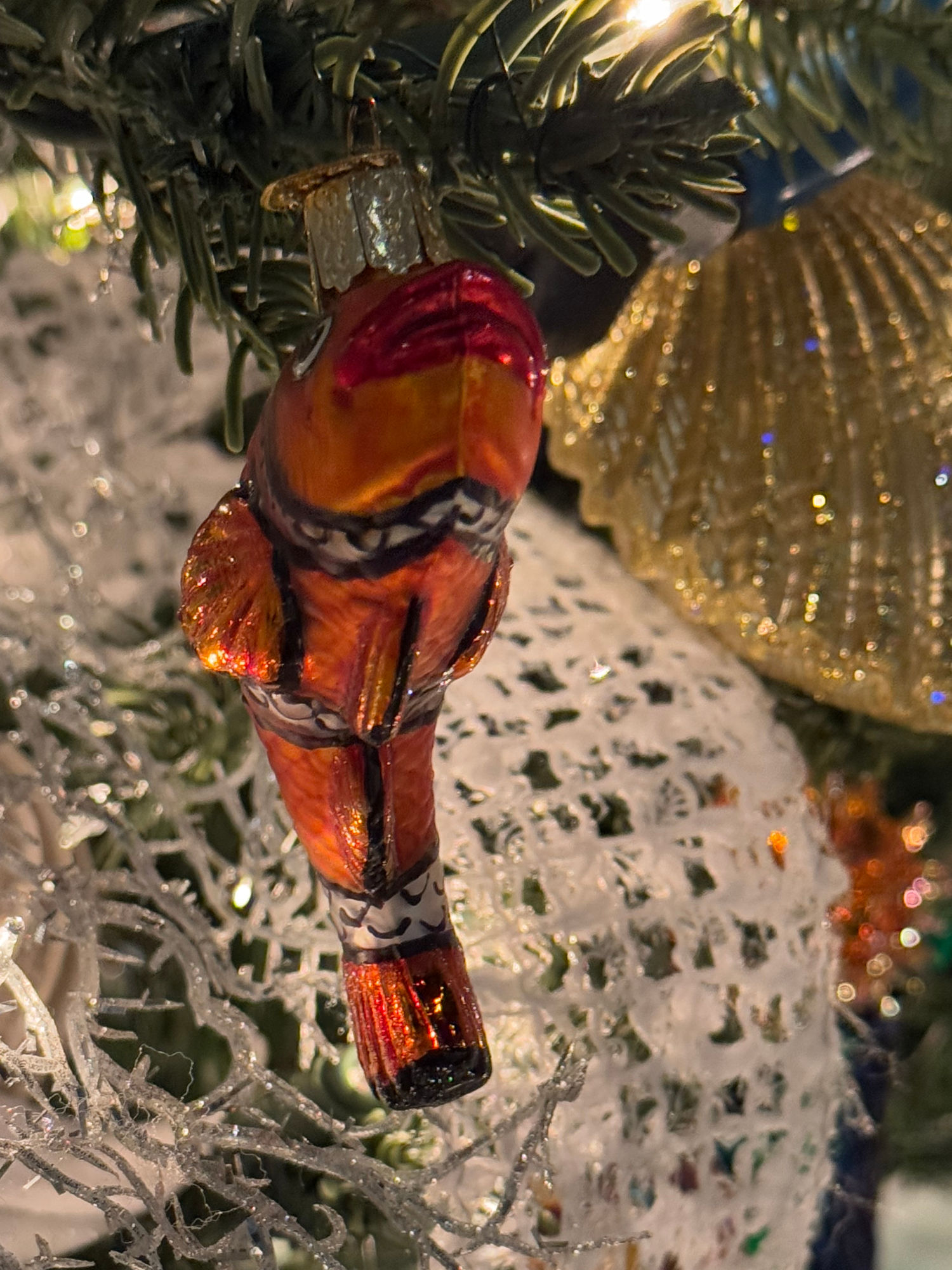
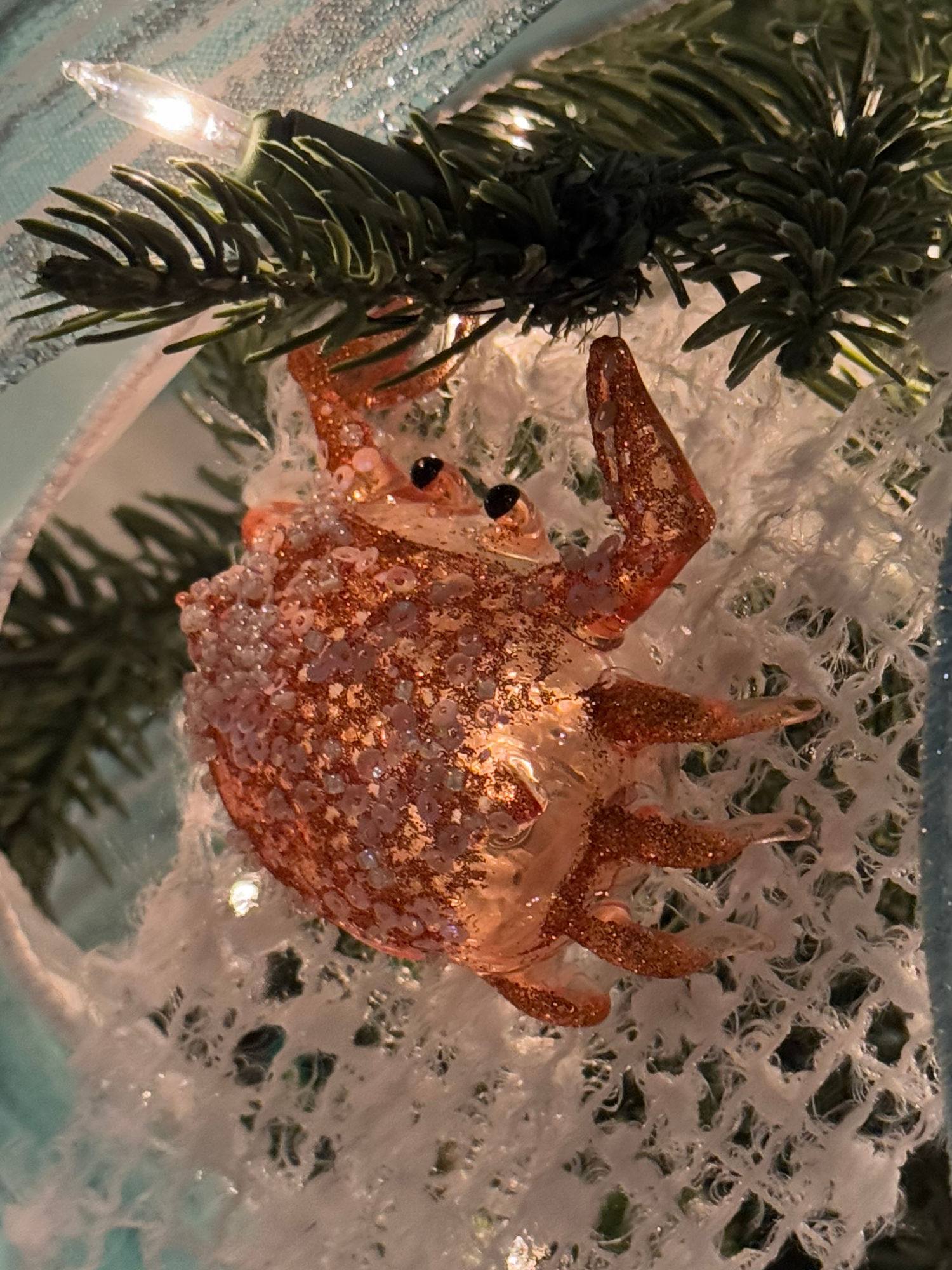
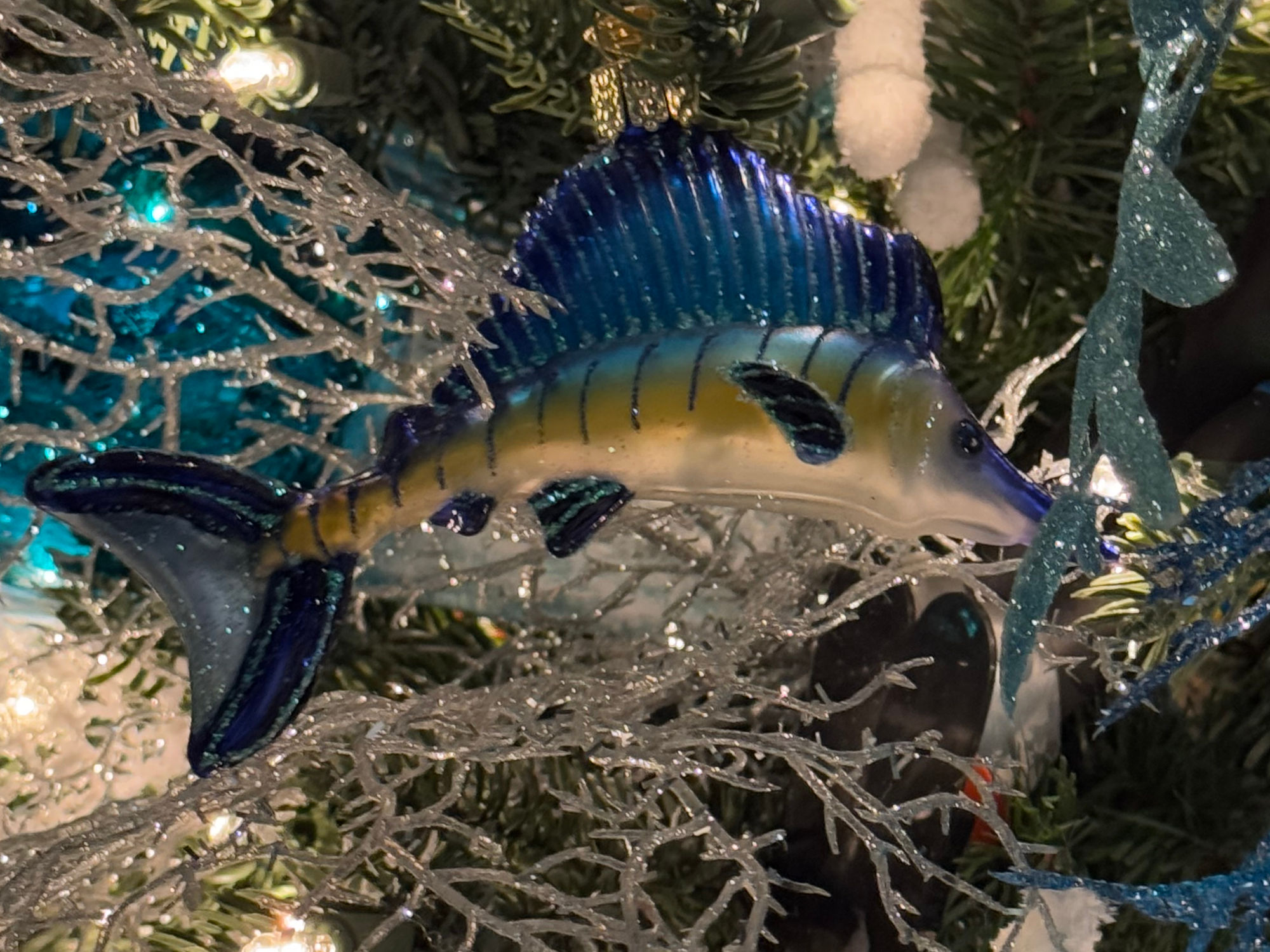
The first sign of Christmas this year were the decorated roundabouts that we started seeing all over the country around the time of Independence Day (30 December): palm trees with Christmas lights in all colours and little wooden decorations, such as shapes of pine trees and signs wishing drivers a Merry Christmas.But with temperatures still around 30 degrees, it really only started feeling like Christmas when I arrived at the Barbados airport having returned from a work trip in early December. Dozens of trees decorated the departure and arrival areas – one for every Commonwealth country! The Barbados Commonwealth Society has apparently placed more than 170 Christmas trees all over the island (50 more than last year), some of which were decorated with the help of local schools.
Many Christmas trees on the island are made of plastic. Pine trees do not exactly grow in abundance here. Some people buy imported trees, but this year people were worried they might not be able to buy a real tree even if they wanted to because of delays at the port. But it all worked out in the end. We even spotted some 2-3m/6-9'-tall trees at a garden center on the West coast along with hundreds of poinsettias ("Christmas stars" – some of these even grow in people's gardens here). And soon enough you would see those willing to spend hundreds of Barbadian dollars on a real tree driving it home on the back of their pickup truck.
To get us in the Christmas mood, we decided to drive to a local Providence (private) school Christmas market, where students sell arts and crafts, plants, food and drinks one weekend a year. We even found a driftwood Christmas tree! Another nice market is the Limegrove Christmas Craft Fair (this year on 7 Dec. – of course, we met fellow Germans and other expats there looking for something Christmassy to do!). Then we went home to decorate our apartment, and got creative using palm instead of fir branches and homemade decorations (i.e. wires to form the letters of "Merry Xmas", cutout paper snowflakes for the chandelier and garlands made of Christmas crackers tied together).
We both went home for Christmas, but we heard from co-workers that Christmas Eve is very quiet here. Most people go to mass in the late afternoon or around midnight, and there is a celebration at Queen's Park in Bridgetown on Christmas Day. Favourite dishes are the Bajan Black Cake (originating from British Black Pudding, but with rum added), Christmas ham or sorrel juice. And new traditions are emerging: Bajans apparently increasingly enjoy going out for Christmas lunch, as many hotels this year reported they were booked up for lunch. Another interesting tradition is a form of "spring-cleaning" that occurs here around Christmas, which sometimes results in mountains of thrown-out furniture and garbage in the streets.
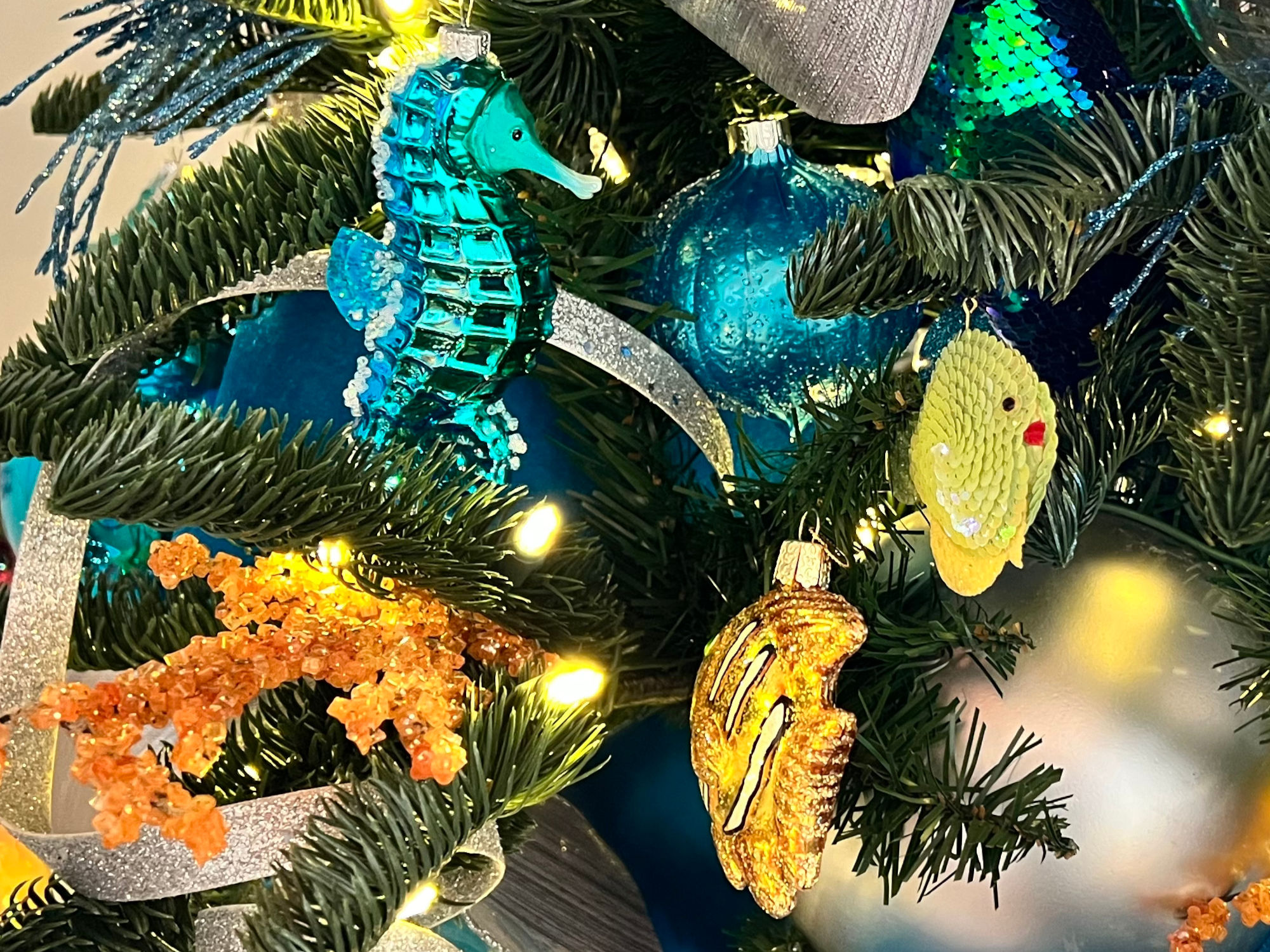
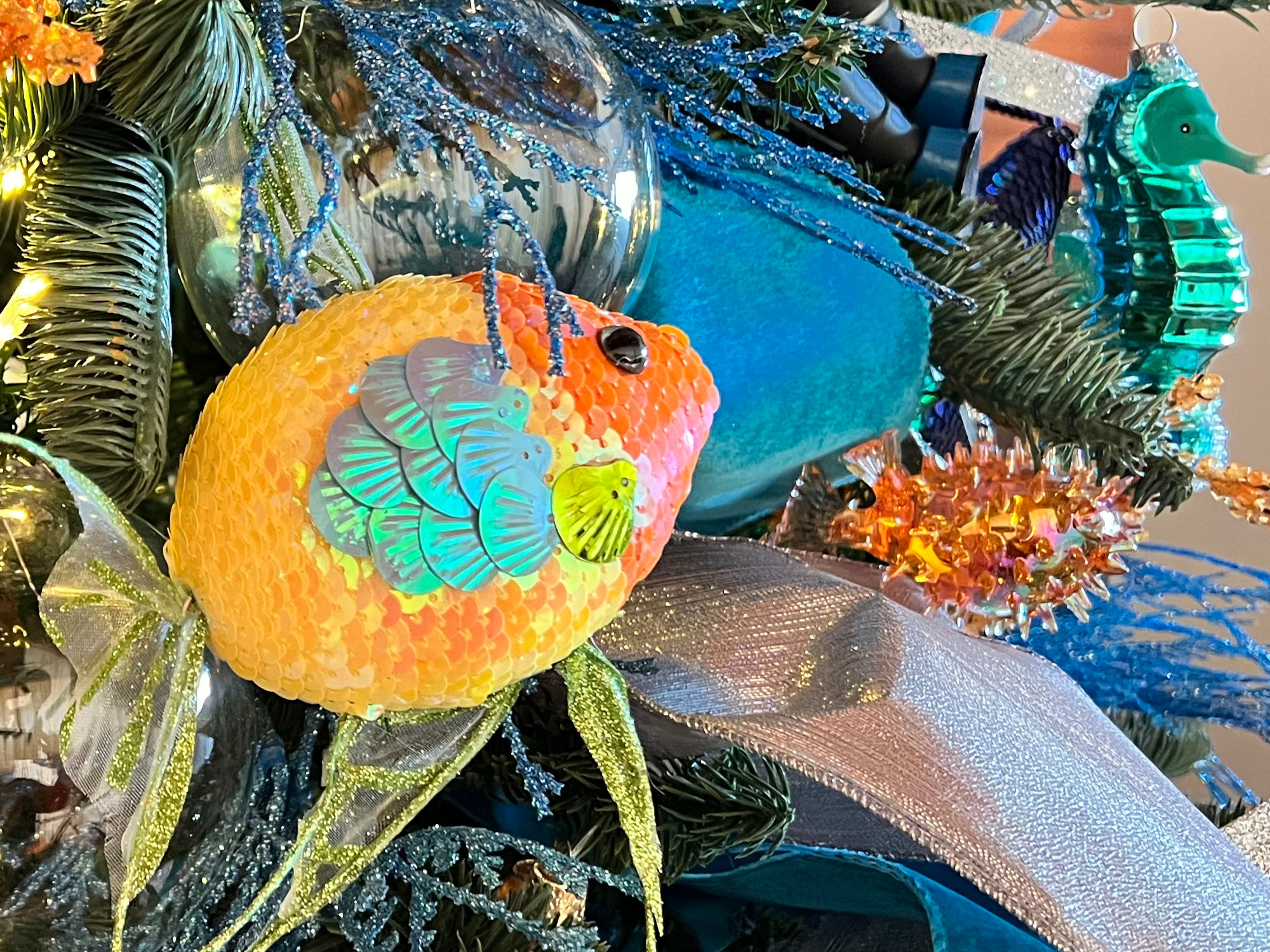
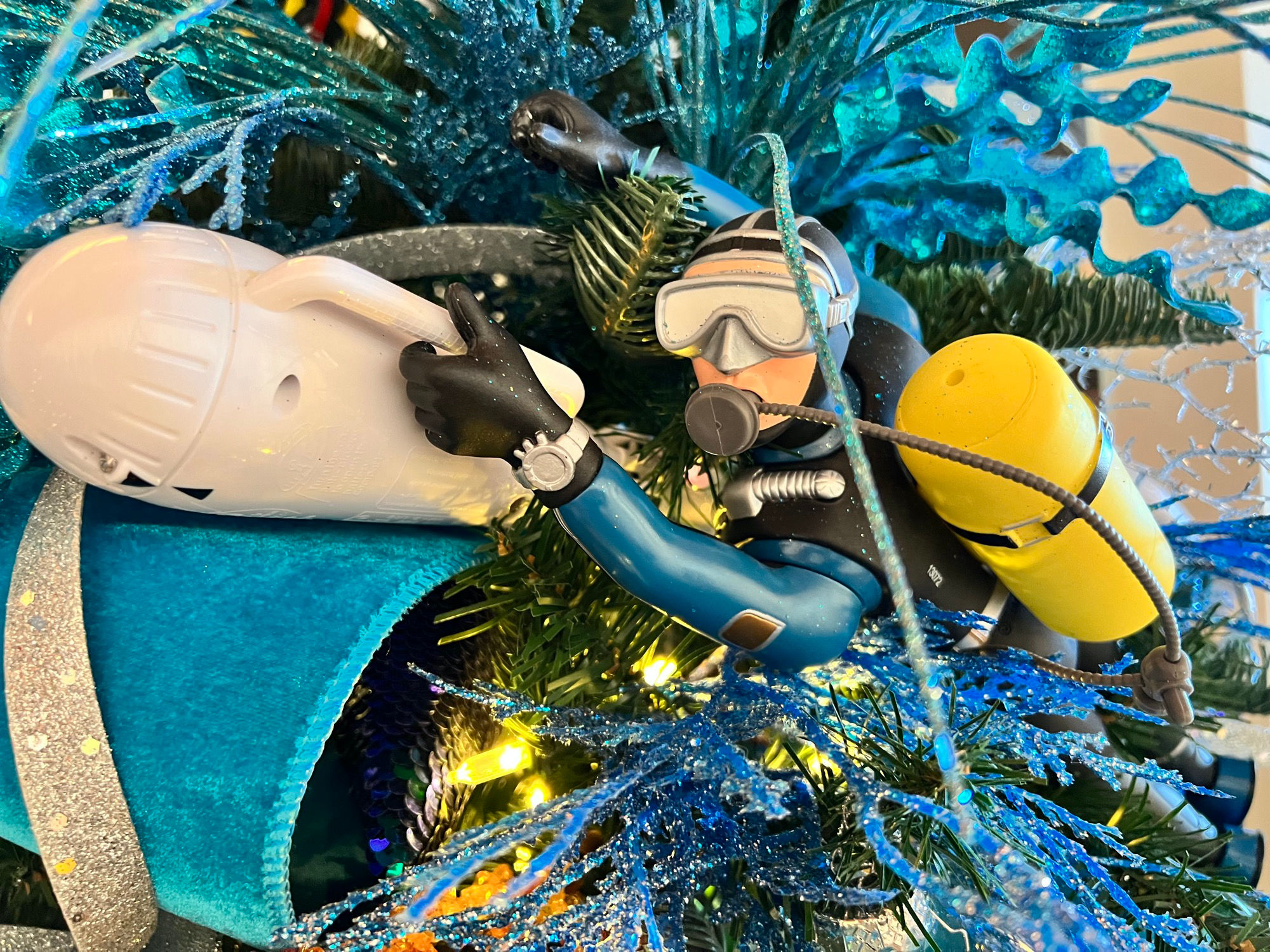
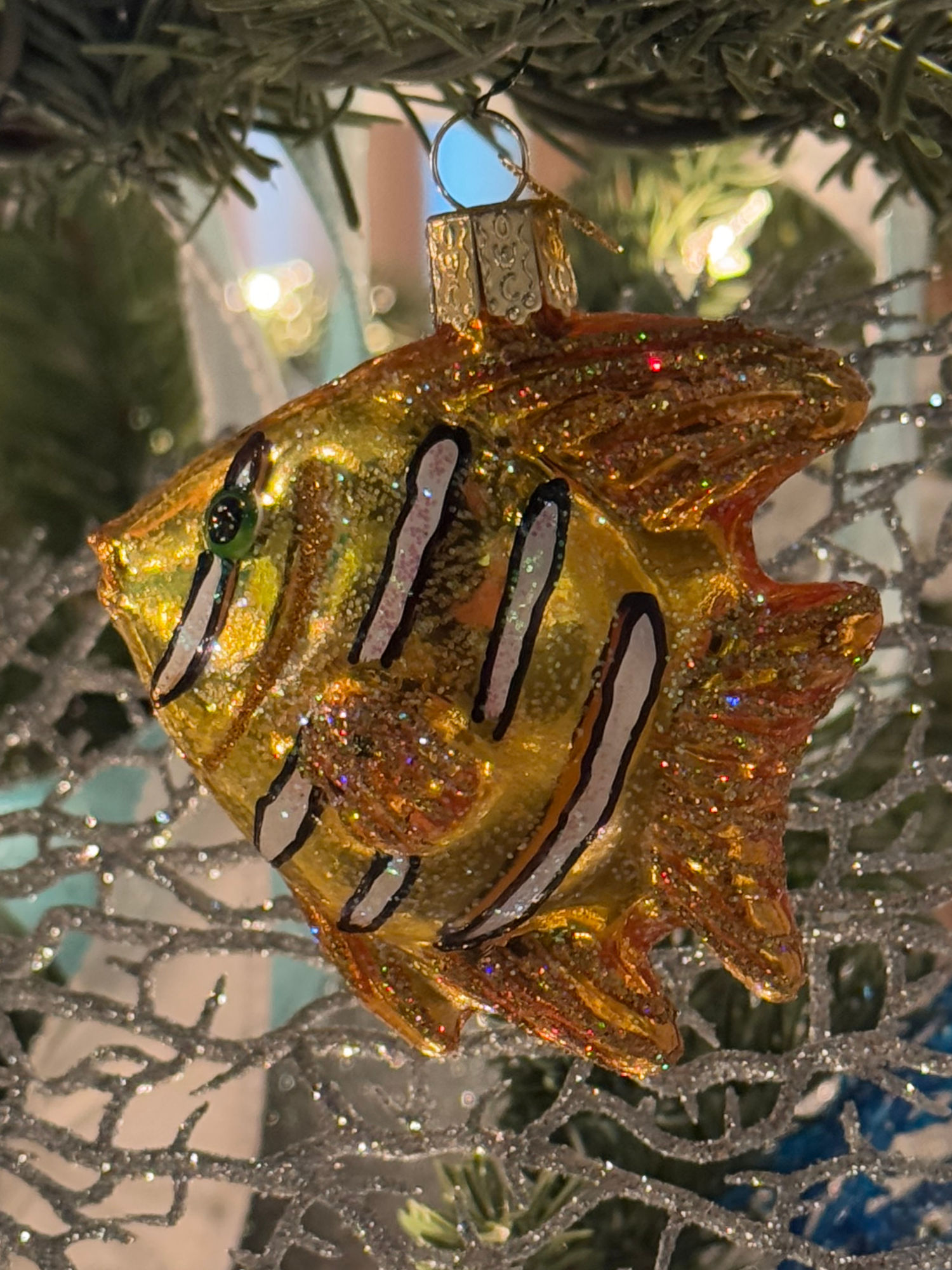
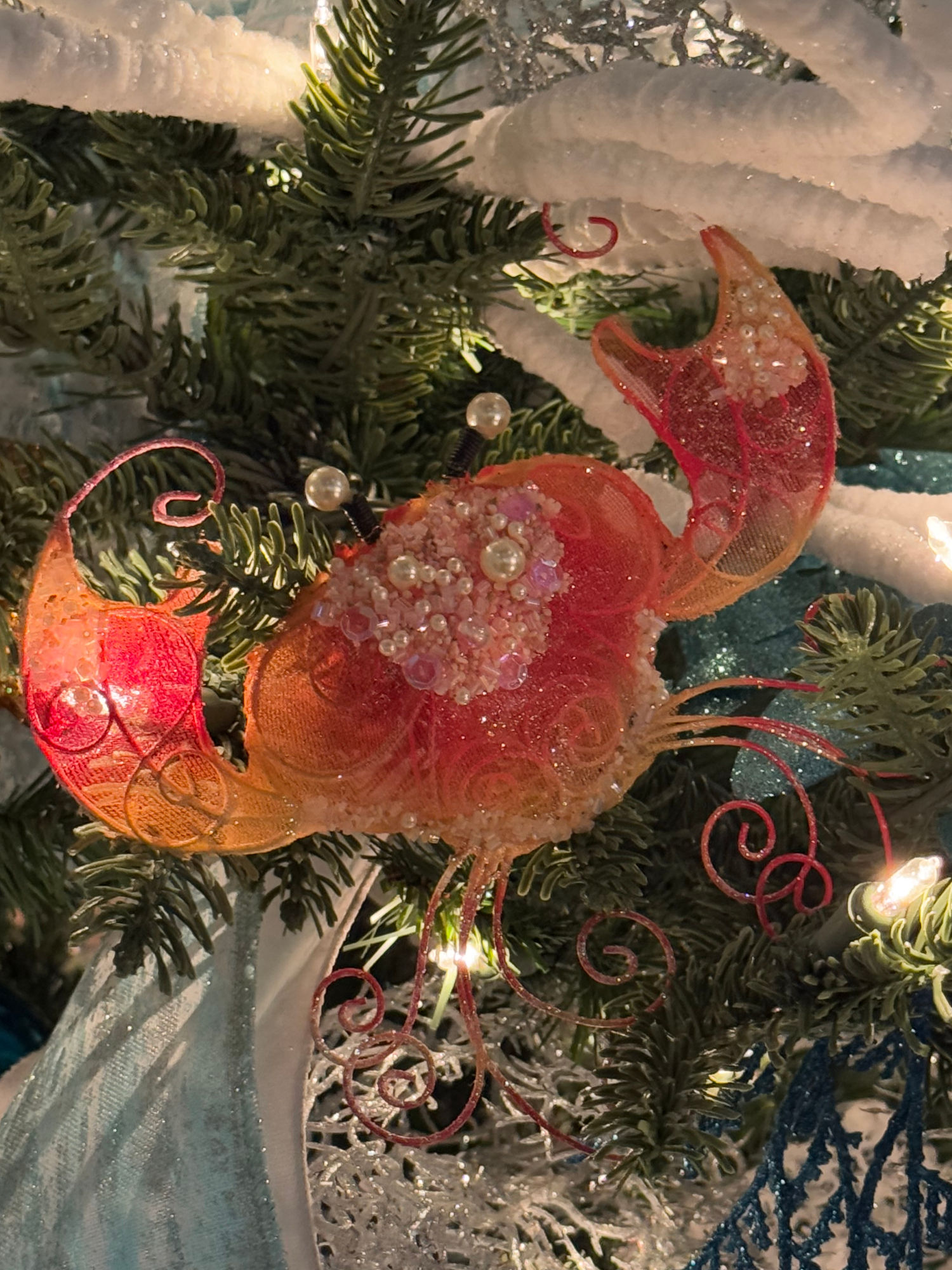
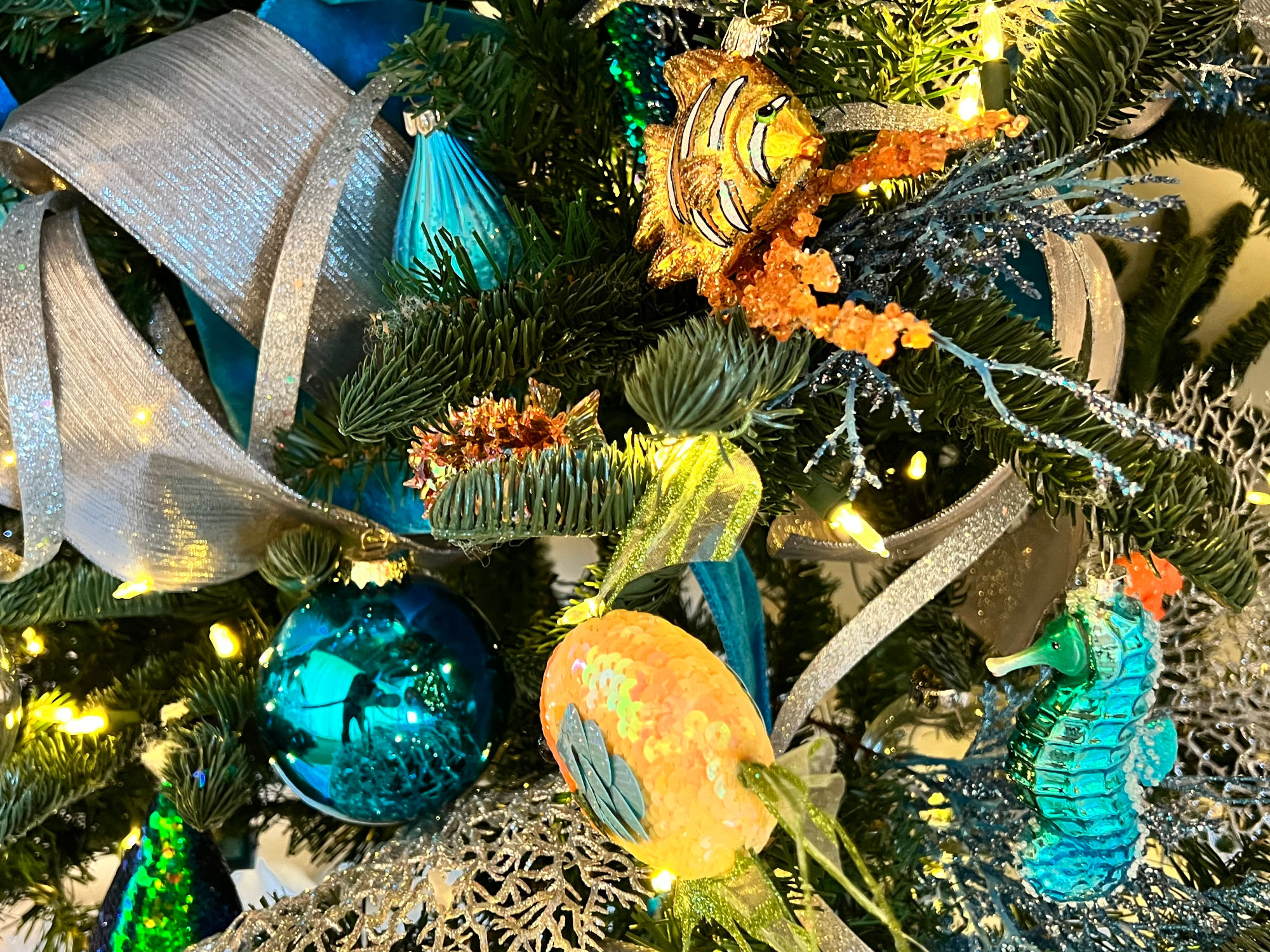
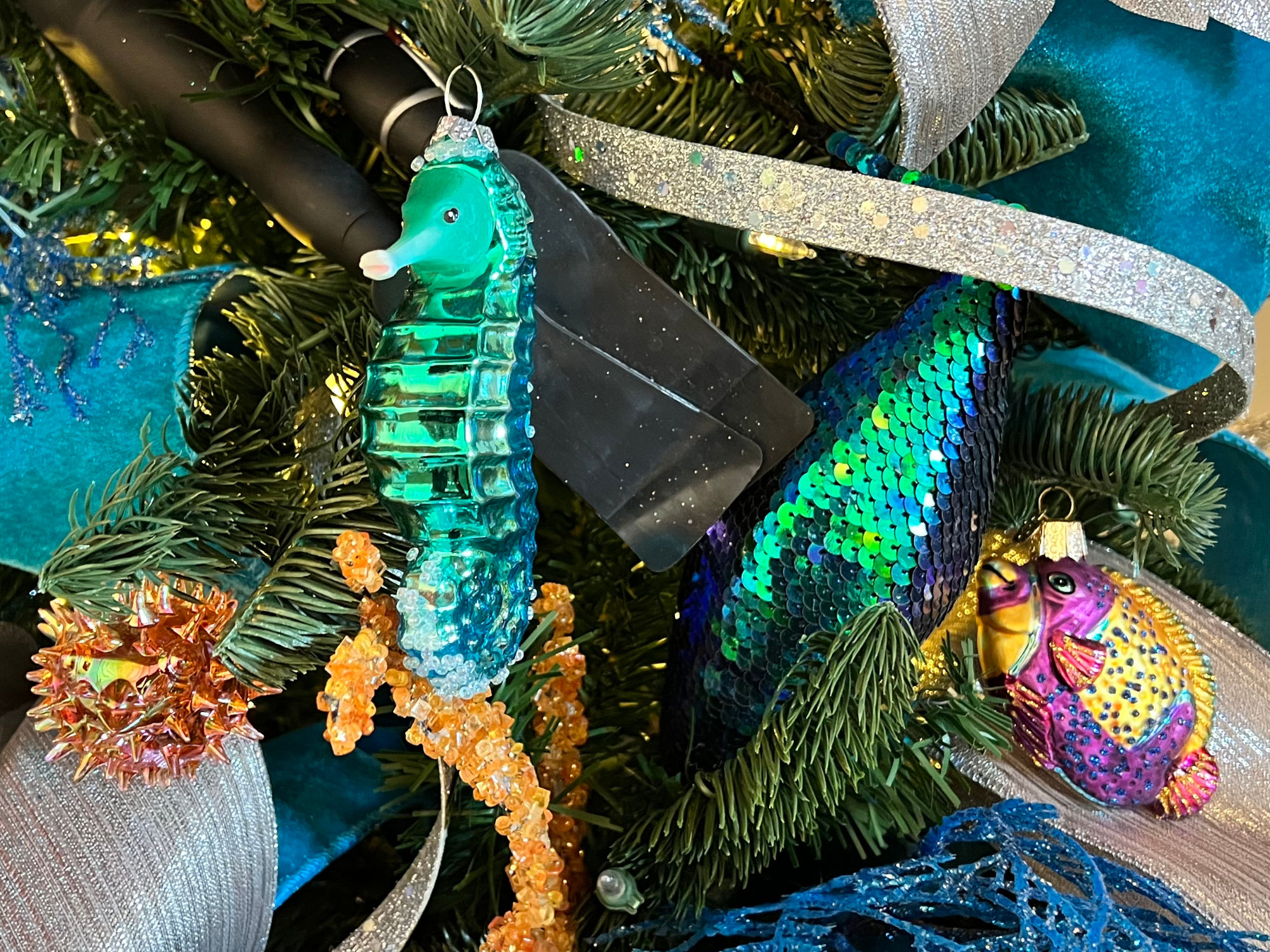
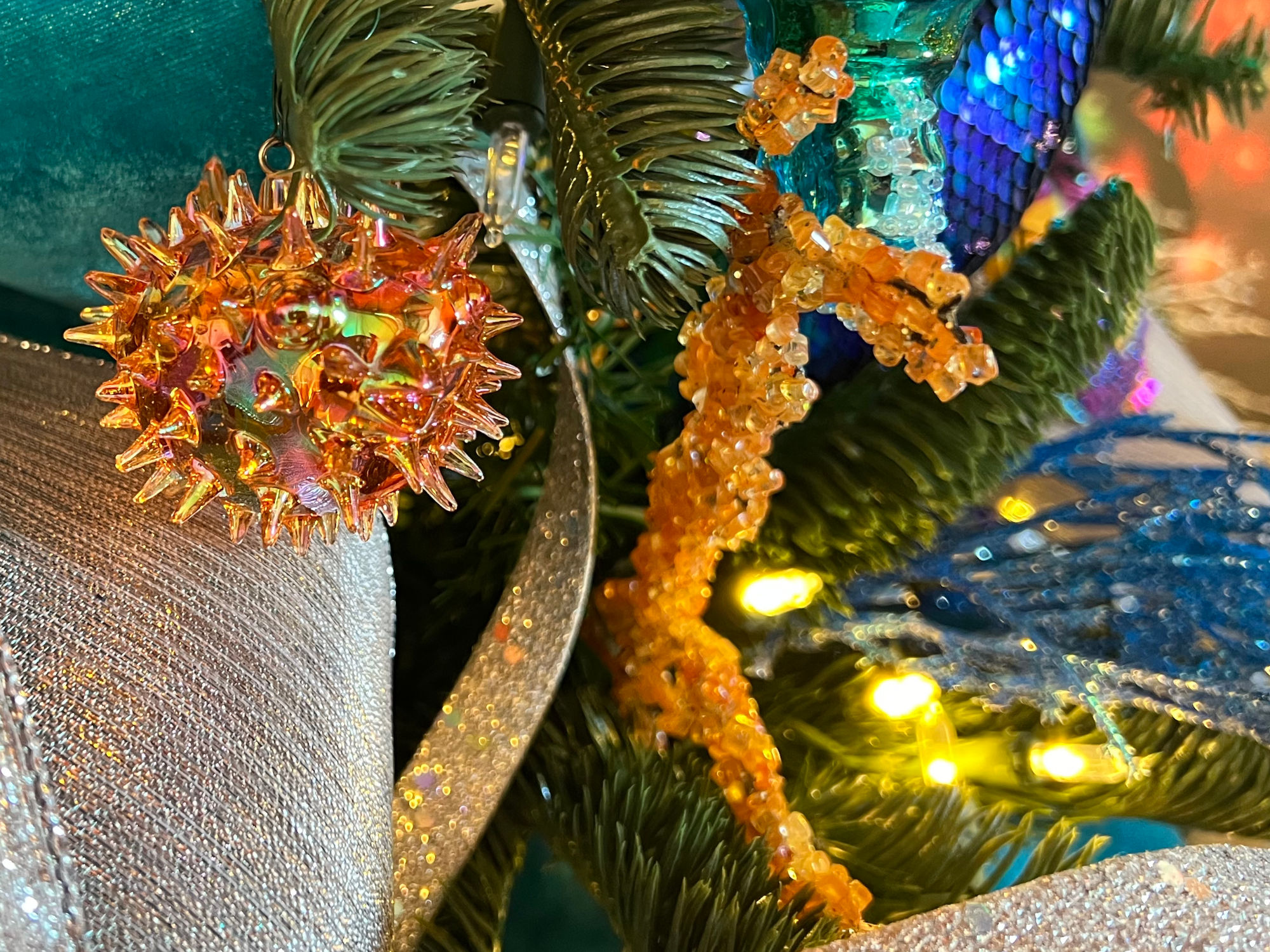

Arrival ceremony in Barbados. President Reagan meets with leaders of eastern Caribbean countries to discuss regional issues of mutual concern.
Ronald ReaganRemarks in Bridgetown, Barbados, Following a Luncheon Meeting With Leaders of Eastern Caribbean CountriesApril 8, 1982
I am honored to be the first United States President to meet with leaders of the eastern Caribbean here in the islands where the history of this new Western World began.Columbus found a thriving Indian civilization when he was sailing through these islands, and that blend of that culture and Spanish, English, Asian, and African has created a very rich culture. There are cultural differences making these island nations each unique in its own way, but at the same time I think that all are bound together with a common heritage of a love of freedom. But at the same time all are bound to each other in more ways than that. And I think the meeting here today serves notice on the world that our destiny is democracy, and the defense of that destiny is one that all of us share.
On the mainland, Central America, as we've been talking about them, rebels, supplied by the Soviet Union through Cuba and Nicaragua, are attempting to shut the door on democracy for the people of El Salvador. Very effective worldwide propaganda has tried to convince the world that Communist guerrillas and terrorists were freedom-fighters representing and having the support of the people of El Salvador. A week ago Sunday that lie was exposed for what it was, once and for all.
Guerrillas destroyed hundreds of buses, so people walked many miles under the threat of death to reach the polling places and vote. And they voted for democracy and against Marxism and the tyranny that it represents.
El Salvador isn't the only country that's being threatened with Marxism, and I think all of us are concerned with the overturn of Westminister parliamentary democracy in Grenada. That country now bears the Soviet and Cuban trademark, which means that it will attempt to spread the virus among its neighbors.
May I suggest that the Caribbean Initiative offers another and, I believe, quite different course. It aims at securing peace, prosperity, and freedom for the Caribbean nations by providing new opportunities for economic development. It is a series in a long-term commitment to make available to you more of the free enterprise system's dynamic and potential that serve the people of my own country so well. Your views will be helpful to me in working to get Congress to approve that plan.
Our ties to the nations of the Caribbean are many and strong, and we mustn't let them be weakened by neglect.
So, will you join me in a -- and may I say, there's a custom in one city of America that maybe we should follow here today, and that is that in Philadelphia they only stand to toast the dead. So, we won't be toasting the dead; we'll be toasting freedom and the opportunity of those still in this New World. And let us hope that we can all remember the dream we share and the tie that binds us all together here in this Western Hemisphere.
NOTEThe President spoke at 2:51 p.m. at the residence of Milan D. Bish, U.S. Ambassador to Barbados.Earlier in the day, the President and Mrs. Reagan left Jamaica and traveled to Barbados. They were greeted upon their arrival at Grantley Adams International Airport by Ambassador Bish, Prime Minister and Mrs. J. M. G. (Tom) Adams, and a delegation of Barbados officials.
Following the welcoming ceremony, the President and Mrs. Reagan went to the U.S. Ambassador's residence, where the President held a meeting and a working luncheon with Prime Minister R. Milton Cato of St. Vincent and the Grenadines, Prime Minister Vere C. Bird, Sr., of Antigua and Barbuda, Prime Minister M. Eugenia Charles of Dominica, Premier Kennedy A. Simmonds of St. Christopher-Nevis, and Prime Minister Adams of Barbados.
Following the luncheon, the President went to Casa de Pablo, a private home owned by Paul H. Brandt, president and chairman of the board of A. Brandt Co., Inc., of Ft. Worth, Tex. The President and Mrs. Reagan stayed at the Brandt residence during their stay in Barbados.
Reagan's Daily DiaryThursday, April 8, 1982
6 P.M. arrived back at the W.H. Hard to sum up the days since Wed. without writing a book. Wed. we arrived at Jamaica & went right into meetings with P.M. Seaga. Amazed at the warmth of the people and their sincere affection for Americans. Met Gov. Gen. & his lady-a state dinner at his residence. Next morning on to Barbados-again a series of meetings this time with P.M.’s of 6 Island Nations. An evening reception & then to Claudette’s (Claudette Colbert) for dinner. The Buckleys have joined us. Fri. our one really clear day off was great. We went down to Claudette’s-all 4 of us-swam in the ocean, lunched, swam some more & then had dinner. She is a wonderfully warm & charming person. Sat. spent morning on homework. Talked to Al Haig in Buenos Aires on the Falkland Islands problem-did my radio broadcast and then to Claudette’s. The tide was high & the ocean rough with waves-surf breaking right on the beach. I swam anyway. Coming in was a chore against the undertow. Sunday-church at the oldest church in the Caribbean. Lunch again at Claudette’s then back to Wash.Key Facts
- President Reagan attends meetings with Prime Ministers of 6 neighboring islands, including Barbados.
- In response to the Hama uprising that began in February, Syria closes its border with Iraq.
Ronald ReaganRemarks Following a Meeting With Barbadian Prime Minister J. M. G. Adams in Bridgetown, BarbadosApril 8, 1982
Sir Deighton, Lady Ward, Your Excellency Prime Minister, Mrs. Adams, Nancy -- [laughter] -- and you ladies and gentlemen:
Nancy and I are delighted to be here. And we have learned another thing, learned it on the way down here, as a matter of fact, and that is that I'm the first President of the United States since 1934 to visit the Caribbean. And I don't know if the others know what they missed. But for those that are still around, I'll be happy to tell them. [Laughter]
And then, of course, I have learned that your Parliament is the third oldest in the New World here and one of the two was a colony -- Virginia -- became a part of the United States.
But you did catch me a little by surprise when you started mentioning that previous career of mine. There's one thing about this job now; I'm on prime time in television. For a long time, I've been on the late, late show. [Laughter] And someone once asked me what it was like seeing myself in those old movies on the late show. It's like looking at a son you never knew you had. [Laughter]
Now, I appreciate your associating yourself with my generation. But I still think I have a little edge on you. I've been reminded of that many times, as to time. It isn't an edge, really, what I mean is that -- well, I know what I mean. I mean I'm older than you are. [Laughter]
I once was talking to some young people about that very subject, because much had been made of it during the campaign. And I was mentioning things that when -- that due to an older generation, we had made so many advances that were going to be so beneficial to the young people. And I said, "I, for example, have lived 10 years longer than my life expectancy when I was born, which turned out to be a source of annoyance to a great many people." [Laughter]
But, seriously, we are delighted to be here and for the purpose of our trip. I recognize that while our heritage goes back to about the same starting point, then in recent years, the ties of the Caribbean nations were more to Western Europe than they were to the United States. Any yet now, as we look at each other, we are nations of the Americas, nations of the Western World, and this is what prompted my coming up with what I call the "Caribbean Initiative." But together, because you are our third border for our country, well, that makes us a border of yours.
And I think it is important that we work together, we find ways in which we can better the life for all our people in all our countries, and this is the purpose of the Caribbean Initiative. And so, I was delighted for the opportunity to come down here and meet not only with your Prime Minister, your Governor General, but with representatives, leaders from several of the other countries here. And we today have been able to discuss some of the problems and the fact that we need your help, your advice and counsel on this plan to make it as workable as we think it can and should be.
And I can understand those people in New York that were desperate to get down here. I don't think it had anything to do with my visit. It's snowing in New York. [Laughter] And that seems a little unusual, but then Nancy and I come from the home of unusual weather -- California. It's a land of sunshine and warmth like this, but it's also the only place in the world where you can fall asleep under a rosebush in full bloom and freeze to death. [Laughter]
So, we just want to thank you for a warm welcome. And I can't wait to get back and be dealing with our Congress on the matter of this initiative and tell them of the warmth that I found here, of welcome, the friendship that I found expressed by the people here, of Barbados, and those of the other countries of the Caribbean nations as well. And we just thank you.
We're sorry that the trip has to be as short as it is. But maybe there'll be a day when we can become tourists and come back here, and we'll set the schedule as to how long we can stay.
Thank you all very much.
NoteThe President spoke at 8 p.m. at Ilaro Court, the official residence of the Prime Minister.Prior to the meeting and reception at Ilaro Court, the President and Mrs. Reagan visited Sir Deighton H. L. Ward, Governor General of Barbados, and Lady Ward, at Government House, the Governor General's residence.
Following the reception at Ilaro Court, the President and Mrs. Reagan attended a private dinner at the home of former movie actress Claudette Colbert. They then returned to Casa de Pablo, a private home owned by Paul H. Brandt, president and chairman of the board of A. Brandt Co., Inc., of Ft. Worth, Tex., where they remained overnight.
WIKIPEDIABarbados
Island country in the Lesser Antilles of the West Indies, in the Caribbean region of North America, and is the most easterly of the Caribbean Islands. It lies on the boundary of the South American and the Caribbean Plates. Its capital and largest city is Bridgetown.Inhabited by Kalinago people since the 13th century, and prior to that by other Amerindians, Spanish navigators took possession of Barbados in the late 15th century, claiming it for the Crown of Castile. It first appeared on a Spanish map in 1511. The Portuguese Empire claimed the island between 1532 and 1536, but abandoned it in 1620 with their only remnants being an introduction of wild boars for a good supply of meat whenever the island was visited. An English ship, the Olive Blossom, arrived in Barbados on 14 May 1625; its men took possession of the island in the name of King James I. In 1627, the first permanent settlers arrived from England, and Barbados became an English and later British colony. During this period, the colony operated on a plantation economy, relying on the labor of African slaves who worked on the island's plantations. Slavery continued until it was phased out through most of the British Empire by the Slavery Abolition Act 1833.
On 30 November 1966, Barbados gained independence and became a Commonwealth realm with Elizabeth II as Queen of Barbados. On 30 November 2021, Barbados transitioned to a republic within the Commonwealth.
Barbados's population is predominantly of African ancestry. While it is technically an Atlantic island, Barbados is closely associated with the Caribbean and is ranked as one of its leading tourist destinations.
EtymologyThe name "Barbados" is from either the Portuguese term os barbados or the Spanish equivalent, los barbados, both meaning "the bearded ones". It is unclear whether "bearded" refers to the long, hanging roots of the bearded fig-tree (Ficus citrifolia), a species of banyan indigenous to the island, or to the allegedly bearded Caribs who once inhabited the island, or, more fancifully, to a visual impression of a beard formed by the sea foam that sprays over the outlying coral reefs.The original name for Barbados in the Pre-Columbian era was Ichirouganaim, according to accounts by descendants of the indigenous Arawakan-speaking tribes in other regional areas, with possible translations including "Red land with white teeth" or "Redstone island with teeth outside (reefs)" or simply "Teeth".
Colloquially, Barbadians refer to their home island as "Bim" or other nicknames associated with Barbados, including "Bimshire".
About 700 thousand years ago, the island emerged from the ocean as a result of a rising body of soft rock in the mantle known as a diapir, located under Barbados, pushing it upwards. This process is still happening, and makes the island rise about 30 centimeters on average every thousand years.
Archeological evidence suggests humans may have first settled or visited the island circa 1600 BC. More permanent Amerindian settlement of Barbados dates to about the 4th to 7th centuries AD, by a group known as the Saladoid-Barrancoid. Settlements of Arawaks from South America appeared by around 800 AD and again in the 12th–13th century. The Kalinago (called "Caribs" by the Spanish) visited the island regularly, although there is no evidence of permanent settlement.
It is uncertain which European nation arrived first in Barbados, which probably would have been at some point in the 15th century or 16th century. The settlement was established as a proprietary colony and funded by Sir William Courten, a City of London merchant who acquired the title to Barbados and several other islands. The first colonists were actually tenants, and much of the profits of their labor returned to Courten and his company.
The introduction of sugar cane from Dutch Brazil in 1640 completely transformed society, the economy and the physical landscape. Barbados eventually had one of the world's biggest sugar industries. The workable sugar plantation required a large investment and a great deal of heavy labor. At first, Dutch traders supplied the equipment, financing, and African slaves, in addition to transporting most of the sugar to Europe.
- In 1644 the population of Barbados was estimated at 30,000, of which about 800 were of African ancestry, with the remainder mainly of English ancestry. By 1680 there were 20,000 free whites and 46,000 enslaved Africans; by 1724, there were 18,000 free whites and 55,000 enslaved Africans.
- Harsh conditions endured by the slaves resulted in several planned slave rebellions, the largest of which was Bussa's rebellion in 1816 which was rapidly suppressed by the colonial authorities.
- The 1780 hurricane killed more than 4,000 people on Barbados.
- The country generally experiences two seasons, one of which includes noticeably higher rainfall. Known as the "wet season", this period runs from June to December. By contrast, the "dry season" runs from December to May.
- It is one of the world's most densely populated isles
- Barbados is host to four species of nesting turtles (green turtles, loggerheads, hawksbill turtles, and leatherbacks) and has the second-largest hawksbill turtle-breeding population in the Caribbean.
- Barbados is also the host to the green monkey. The green monkey is found in West Africa from Senegal to the Volta River. It has been introduced to Barbados in the late 17th century when slave trade ships travelled to the Caribbean from West Africa.
- The 2010 national census conducted by the Barbados Statistical Service reported a resident population of 277,821, of which 144,803 were female and 133,018 were male.
- Close to 90% of all Barbadians (also known colloquially as "Bajan") are of Afro-Caribbean ancestry ("Afro-Bajans") and mixed ancestry.
- English is the official language of Barbados
- Christianity is the largest religion in Barbados, with the largest denomination being Anglican (23.9% of the population in 2019). Other Christian denominations with significant followings in Barbados are the Catholic Church (administered by Roman Catholic Diocese of Bridgetown), Pentecostals (19.5%), Jehovah's Witnesses, the Seventh-day Adventist Church and Spiritual Baptists. The Church of England was the official state religion until its legal disestablishment by the Parliament of Barbados following independence.
- Barbados has been an independent country since 30 November 1966. The Constitution of Barbados is the supreme law of the country. Legislation is passed by the Parliament of Barbados but does not have the force of law unless the President grants assent to that law. Barbados functions as a two-party system. The dominant political parties are the Democratic Labour Party and the incumbent Barbados Labour Party. Since independence on 30 November 1966, the Democratic Labour Party (DLP) has governed from 1966 to 1976; 1986 to 1994; and from 2008 to 2018; and the Barbados Labour Party (BLP) has governed from 1976 to 1986; 1994 to 2008; and from 2018 to present.
- Barbados is an original member (1995) of the World Trade Organization and participates actively in its work.
- Barbados is divided into 11 parishes:
- Christ Church
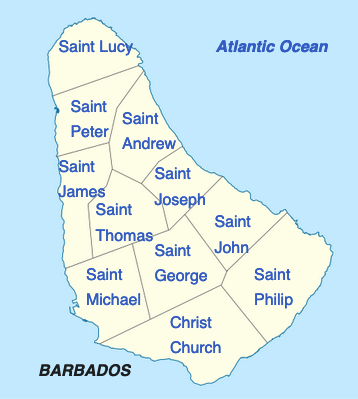
- Saint Andrew
- Saint George
- Saint James
- Saint John
- Saint Joseph
- Saint Lucy
- Saint Michael
- Saint Peter
- Saint Philip
- Saint Thomas
- Historically, the economy of Barbados had been dependent on sugarcane cultivation and related activities, but since the late 1970s and early 1980s it has diversified into the manufacturing and tourism sectors. Offshore finance and information services have become important foreign exchange earners.
- Barbados is the 52nd richest country in the world in terms of GDP (Gross Domestic Product) per capita, has a well-developed mixed economy, and a moderately high standard of living. According to the World Bank, Barbados is one of 83 high income economies in the world. Despite this, a 2012 self-study in conjunction with the Caribbean Development Bank revealed 20% of Barbadians live in poverty, and nearly 10% cannot meet their basic daily food needs.
- The Barbados literacy rate is ranked close to 100%. The mainstream public education system of Barbados is fashioned after the British model.
- Barbados is a blend of West African, Portuguese, Creole, Indian and British cultures. Citizens are officially called Barbadians.
- The largest carnival-like cultural event that takes place on the island is the Crop Over festival, which was established in 1974. Crop Over gets under way at the beginning of July and ends with the costumed parade on Kadooment Day, held on the first Monday of August.
- Bajan cuisine is a mixture of African, Indian, Irish, Creole and British influences. A typical meal consists of a main dish of meat or fish, normally marinated with a mixture of herbs and spices, hot side dishes, and one or more salads. A common Bajan side dish could be pickled cucumber, fish cakes, bake, etc. The meal is usually served with one or more sauces. The national dish of Barbados is cou-cou and flying fish with spicy gravy. Another traditional meal is pudding and souse, a dish of pickled pork with spiced sweet potatoes. A wide variety of seafood and meats are also available.
- Cockspur Rum and Malibu Rum are from the island. The Mount Gay Rum visitor's center in Barbados claims to be the world's oldest remaining rum company, with the earliest confirmed deed from 1703.
- The music of Barbados includes distinctive national styles of folk and popular music, including elements of Western classical and religious music. In 2009, Rihanna, a native of Barbados, was appointed as an Honorary Ambassador of Youth and Culture for Barbados by the late Prime Minister, David Thompson.
- Barbados hosted the final of the 2007 Cricket World Cup. Cricket is very popular on the island. Barbados has produced many great cricketers including Sir Garfield Sobers, Sir Frank Worrell, Sir Clyde Walcott, Sir Everton Weekes, Gordon Greenidge, Wes Hall, Charlie Griffith, Joel Garner, Desmond Haynes and Malcolm Marshall.
- In Barbados, drivers drive on the left side of the road. Although Barbados is about 21 miles across at its widest point, a car journey from Six Cross Roads in St. Philip (south-east) to North Point in St. Lucy (north-central) can take one and a half hours or longer due to traffic. Barbados has half as many registered cars as citizens. Barbados is known for its many roundabouts. Transport on the island is relatively convenient with "route taxis" called "ZRs" (pronounced "Zed-Rs") traveling to most points on the island. These small buses can at times be crowded, as passengers are generally never turned down regardless of the number.




